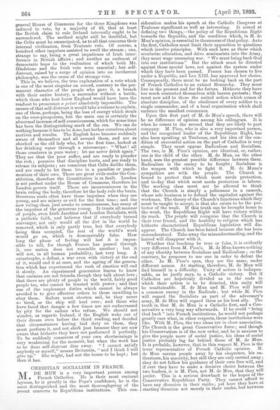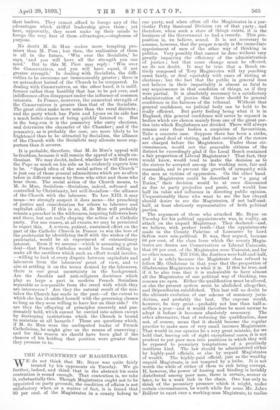CHRISTIAN SOCIALISM IN FRANCE.
AT DE WIN is a very important person among III. • French Catholics. He is their most eminent layman, he is greatly in the Pope's confidence, he is the most distinguished and the most thoroughgoing of the recent converts to Republican institutions. This con- sideration makes his speech at the Catholic Congress at Toulouse significant as well as interesting. It aimed at defining two things,--the policy of the Republican Right towards the Republic, and the condition which, in M. de Mun's opinion, is essential to the su mess of that policy. As to the first, Catholics must limit their opposition to questions which involve principles. With such laws as those which secularise education, and drive seminarists into the Army, they must wage unceasing war. " We must bring back God into our institutions." But the attack must be directed against these special laws, not against the system under which they have been passed. France has chosen to live under a Republic, and Leo XIII. has approved her choice. Consequently, there must be no looking back on the part of French Catholics to an extinct Monarchy. They must live in the present and for the future. Hitherto they have too much contented themselves with barren protests; they must now add to these the united action which comes of absolute discipline, of the obedience of every soldier to a single commander, and of a local organisation which shall embrace the smallest communes.
Upon this first part of M. de Mun's speech, there will be no difference of opinion among his colleagues. It is when he comes to the second that they are likely to part company. M. Piou, who is also a. very important person, and the recognised leader of the Republican Right, has also been speaking at Toulouse, and his idea of the con- dition of successful action on the part of Catholics is very simple. They must oppose Radicalism and Socialism. The two, in M. Piou's opinion, are identical, or, rather, one is the child of the other. M. de Mun, on the other hand, sees the greatest possible difference between them. Radicalism is the enemy to be fought ; Socialism is the weapon with which to fight it. M. de Muns's sympathies are with the people. The Church is bound to protect that which most needs protection, and to-day that which most needs protection is labour. The working class must not be allowed to think that the Church is simply a policeman in a cassock, whose sole business is to defend the capitalist against the workman. The theory of the Church's functions which they must be taught to accept, is that she exists to be the pro- tector of the weak. If this truth can be brought home to the weak, the Republican Right will have victory within its reach. The people will recognise that the Church is their true friend, and the hostility to religion which has hitherto characterised Republican legislation will dis- appear. The Church has been hated because she has been misunderstood. Take away the misunderstanding, and the hatred will disappear with it. Whether this teaching be true or false, it is evidently very different from M. Piou's. M. de Mun knows nothing of any identity between Socialism and Radicalism ; on the contrary, he proposes to use one in order to defeat the other. In M. Piou's eyes, they are the same, under different names. At starting, therefore, M. de Man will find himself in a difficulty. Unity of action is indispen- sable, as he justly says, to a. Catholic victory. But if Catholics are hopelessly divided as to the ends to which their action is to be directed, this unity will be unattainable. M. de Mun and M. Piou will have a common enemy in the Radicals ; but while M. Piou will regard the Socialists as part of the adversary's army, M. de Mun will regard them as his best ally. The truth is, that M. de Mun is a Catholic first, and a Con- servative a very long way afterwards. If he could " bring God back " into French institutions, he would not perhaps greatly care what, in other respects, those institutions were like. With M. Piou, the two ideas are in close association. The Church is the great Conservative force; and though his Conservatism is of the new order, and he is anxious to Five the people more of socialjustice, his ideas of social justice probably lag far behind those of M. de Mun. It is probable, however, that in this respect M. Piou is the truer representative of French Catholic opinion. M. de Mun carries people away by his eloquence, his en- thusiasm, his sincerity, but still they are only carried away ; they do not follow his guidance of their own free will, and if ever they have to make a decisive choice between the two leaders, it is M. Piou, not M. de Mun, that they will prefer. This is a serious drawback to the hopes of the Conservative Republican Party. They cannot afford to have any disunion in their ranks ; yet here they have at starting disunion not merely in their ranks, but between their leaders. They cannot afford to forego any of the advantages which skilful leadership gives them ; yet here, apparently, they must make up their minds to forego the very first of these advantages,—singleness of purpose.
No doubt M. de Mun makes more tempting pro- raises than M. Piou ; but then, the realisation of them is all in the future. Win over the Socialists,' he says, and you will have all the strength you can need.' But to this M. Piou may reply : ' Win over the Conservatives, and you will have equal, if not greater strength.' In dealing with Socialists, the diffi- culties to be overcome are immeasurably greater ; there is an antecedent hatred of the Church to be conquered. In dealing with Conservatives, on the other hand, it is indif- ference rather than hostility that has to be got over, and indifference often disappears under the influence of common interests. In France, moreover, the numerical strength of the Conservatives is greater than that of the Socialists. The great cities make more noise than the rural districts ; and the party which has Paris and Lyons on its side has a much better chance of being quickly listened to. But in the long-run it is the peasantry who carry elections, and determine the character of the Chamber; • and if the peasantry, as is probably the case, are more likely to be frightened than to be attracted by Socialism, the alliance of the Church with the Socialists may alienate more sup- porters than it secures.
It is probable, therefore, that M. de Mures appeal will be fruitless, because it will remain the appeal of a single en- thusiast. We may doubt, indeed, whether he will find even the Pope as much on his side as he evidently expects him to be. "Speak often of the social action of the Church" is just one of those general admonitions which are so often taken in different senses by those who utter and those who hear them. The social action of the Church means, to M. de 311113, Socialism—Socialism indeed, softened and controlled by Christianity, but still Socialism—the alliance of the Church with the labourer. To Leo XIII. it may mean—we strongly suspect it does mean—the preaching of justice and consideration for others to labourer and capitalist alike. If this is so, M. de Mun will probably remain a preacher in the wilderness, inspiring followers here and there, but not really shaping the action of a Catholic party. For one reason, at all events, we may be permitted to regret this. A serious, patient, sustained effort on the part of the Catholic Church in France to win the love of the proletariat by identifying itself with the wishes of the proletariat, would be an experiment of extraordinary interest. Even if we assume—which is assuming a great deal—that French Catholics would be found willing to make all the sacrifices which such an effort would involve, —willing to look at every dispute between capitalists and labourers from the labourers' point of view, and to aim at settling it on the terms desired by the labourers, there is one great uncertainty in the background. Are the Jacobin and anti-religious doctrines which play so large a part in modern French Socialism separable or inseparable from the creed with which they are interwoven ? Are they the natural result of the mis- takes the Church has made in the past—of the extent to which she has identified herself with the governing classes so long as they were willing to have her on their side P Or are they the offspring of principles sincerely and pas- sionately held, which cannot be carried into action except by destroying institutions which the Church is bound to maintain at all hazards ? These are questions which, if M. de Mun were the undisputed leader of French Catholicism, he might give us the means of answering ; and for this reason we should have been glad if the chances of his holding that position were greater than they promise to be.



















































 Previous page
Previous page